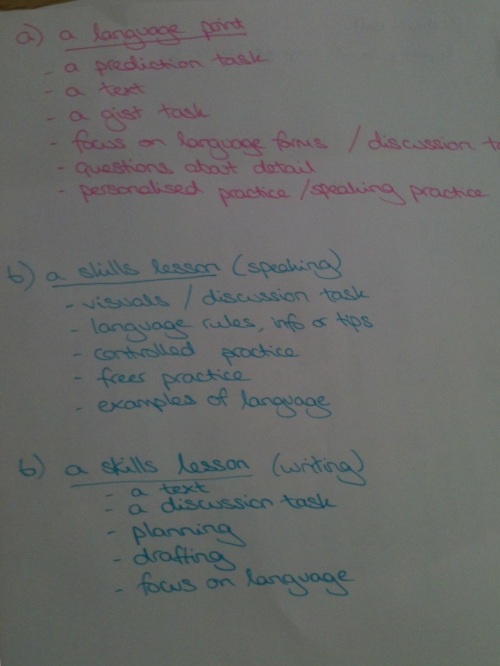As I mentioned in my earlier post, we need to produce our own materials to offer students more up-to-date data , reinforce their learning and most importantly, meet their needs. There seems to be a mismatch between what coursebooks include and learners need. This probably results from globally designed coursebooks trying to cater for different needs in one book. If we regard learners as customers and continue to publish books for market purposes , how can we expect them to be satisfied with a ‘one size-fits all’ product?
This cartoon shows a man holding a tee-shirt with the slogan “One size fits all”. The man asks his three colleagues, “Will this do for you”. One colleague replies, “No-that won’t fit Me”. Another says, “We are ALL unique with individual needs and requirements”. Similarly, one coursebook doesn’t fit all as every class is unique and has a different cultural background, needs, interests and abilities.
Using teacher-produced materials makes a number of valid points because they are relevant to students’ needs that reflect local content, issues and concerns. I have observed in my classrooms that students don’t only struggle to learn English but also to understand the culture. Most of them even don’t know famous singers,actors and actresses in the world. At this point, teachers can make some adaptations, modify the content according to the learners’ needs or bring their own materials to the classroom. Students will probably be more interested in talking about the people they know. I am also aware of the fact that learning a language requires gaining its culture but sometimes these adaptations are necessary to engage the learners.
On the other hand, I am not against of using coursebooks as they also offer many advantages both teachers and learners. Some advantages Richards (2001:255) notes are as follows. They help standardize instruction which is very important to ensure that the students in different classes receive similar content. I worked at a university where 200 teachers were working and there were nearly 50 classes. In such a big institution, not using a coursebook cannot be an option as students are tested in the same way. Another advantage is that they maintain quality because if a well-developed textbook is used, students are exposed to materials that have been tried and tested. However, they can be supplemented by teacher-produced materials. Coursebooks can also train teachers who have limited teaching experience. For example,if they are new in the profession, a coursebook together with the teacher’s manual can serve as a medium of initial teacher training.
This argument may raise the question whether to use coursebooks or teacher-produced materials in the EFL classroom. The point is surely rather that using materials that can cater the needs of learners. These needs can be met by coursebooks or teacher-produced materials depending on the unique nature of the classroom. Sometimes you can use both to reinforce the learning. For example, the teacher can create his/her worksheet to supplement the coursebook when it lacks appropriate exercises At this point, the teacher should be a good observer to analyze the needs of the learners. If a coursebook is designed for market purposes, isn’t culturally appropriate and has bland topics then it would be much more appropriate to use teacher-produced materials. On the contrary; if teachers are in the early stages of their careers and students are tested in the same way, coursebooks should be the primary source for teaching and could be supplemented by teacher-produced materials. Last but not least, teachers should be aware of the fact that ‘one size doesn’t fit all’ that’s why they should produce their own materials or make some adaptations where necessary regarding their learners’ needs.
References
Richards , J .C. (2001) Curriculum Development in Language Teaching. Cambridge: Cambridge University Press.
Picture taken from http://wiki.cetis.ac.uk/Web_2.0_Applications_and_Accessibility


 The ELT Journal debate at IATEFL Liverpool was a lively and well-attended affair. Thanks to the British Council, you can see the whole event online on the IATEFL Liverpool website. Here, Catherine Walter, who opposed the motion, gives her round up of the debate.
The ELT Journal debate at IATEFL Liverpool was a lively and well-attended affair. Thanks to the British Council, you can see the whole event online on the IATEFL Liverpool website. Here, Catherine Walter, who opposed the motion, gives her round up of the debate.
